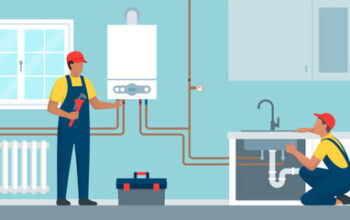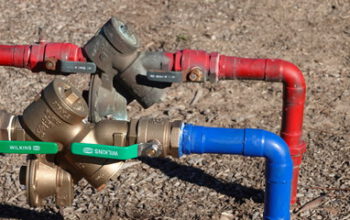Plumber Clearwater FL install and repair piping, fixtures, and appliances such as sinks, toilets, and water heaters. They also inspect and maintain existing systems to identify issues like leaks and clogs. They often collaborate with other professionals, such as construction teams and architects, to ensure plumbing systems are integrated seamlessly into building projects.
Job Duties

Plumbers assemble, detect issues with and repair pipes and systems that carry water or gas to and from fixtures and appliances such as sinks, toilets, bathtubs, showers and garbage disposals. They use a wide range of tools, equipment and materials in their work and must be comfortable with physical labor. A plumber must also have good analytical problem-solving skills and the ability to communicate with customers to understand their needs and explain plumbing options.
Plumber job duties include installation, maintenance and repair of residential and commercial plumbing systems. They read blueprints and architectural plans to determine the best way to install plumbing for new construction projects or retrofits. In addition, they perform drain cleaning and backflow testing on existing pipes. Plumbers may need to climb stairs or ladders in tight spaces or work outside, depending on the nature of a particular project.
A plumber’s responsibilities may differ from company to company. Some plumbers may specialize in installing only toilets and faucets, while others might focus on water heaters or whole-house repiping. Regardless of their area of expertise, all plumbers must be skilled at using hand tools, power tools and other machinery to make repairs or replace parts. They must also have the physical stamina to stand for long periods on their feet and be able to lift heavy objects.
Some plumbers only work on service and repair calls, responding to emergency requests from customers who have clogged drains or broken water heaters. These plumbers must be able to troubleshoot problems and fix them quickly in order to meet the customer’s needs. In some cases, these plumbers will need to travel between different locations to address several problems at once.
The salary that a plumber receives depends on the type of work they do and the size of the company for whom they work. Some plumbers may be self-employed contractors who set their own rates, while others work for large corporations or municipalities that have in-house plumbing teams. The job description should clearly state the pay rate, as well as any other perks or benefits that the company offers, such as health insurance or vacation days.
Education and Training Requirements
A plumber must have extensive knowledge of the various systems and tools of the trade, ranging from residential plumbing in homes to more complex commercial and industrial systems. They also need to understand the theory behind these systems and be able to troubleshoot problems effectively. A plumber must also be able to work safely, as many jobs require them to operate heavy equipment and climb into awkward spaces.
Plumbers typically receive their education through an apprenticeship program that combines classroom instruction with paid on-the-job training. These programs can last from four to five years and include up to 2,000 hours of classroom instruction and hands-on learning. Many programs are sponsored by trade unions, which help ensure a good quality of education and training.
Some plumbers also pursue a postsecondary education at technical or trade schools, which can provide more in-depth and rigorous training. These programs can lead to a diploma and often cover topics like local plumbing codes, blueprint reading, and safety practices. Some of these programs even offer certification exams, which can give you a competitive edge in the job market.
Depending on where you live, you may need to obtain a license to practice as a plumber. This process will vary by state, but it will likely involve passing an exam and demonstrating your skills. In addition, some states require that you complete on-the-job training under the supervision of a licensed master plumber.
Another way to gain experience is by seeking out additional opportunities outside of your normal employment, such as volunteering for community projects or working on small independent jobs (where allowed). This can provide you with a variety of different experiences and challenges, and allow you to build problem-solving skills.
In the current economy, there is a tremendous demand for skilled tradespeople. Many people who previously held plumbing jobs have reached retirement age, which means that there are plenty of opportunities for young plumbers. The housing and banking crisis of 2008 resulted in massive unemployment in the construction industry, but this has provided an opportunity for new plumbers to enter the field.
Work Environment
Many plumbers choose to be self-employed and run their own plumbing business. This option provides greater job flexibility and control over work schedules, projects, and earnings. However, being an independent contractor can also make the job more stressful and physically demanding as plumbers must often perform heavy lifting and crawl into tight spaces. Depending on the area of specialization, some plumbers may also be exposed to dangerous chemicals and sewage.
Plumbers typically work in a variety of environments, including residential, commercial, and industrial settings. They may work on new construction projects or repair existing systems. They may also be responsible for laying out water supply and drainage lines or working with other members of the construction team to ensure that the plumbing system is properly integrated into the building’s overall infrastructure.
Some plumbers are required to be on call for emergency services, which means that they may have to work overtime or on weekends to address urgent situations such as a burst pipe. They may also be required to travel to different locations to complete their jobs, which can be difficult for those with family obligations or other commitments.
As a tradesperson, plumbers must be familiar with the latest industry techniques and technologies to stay competitive and meet client needs. They may also be required to maintain certification by attending continuing education courses or writing industry exams. Those who are interested in becoming a plumber can find a training program at a local vocational school or through an apprenticeship opportunity.
While the career path to become a plumber can be challenging, it is also very rewarding. The ability to fix problems and create efficient systems that benefit the health, safety, and comfort of the public is a significant contribution to society. In addition, plumbers are in high demand because of the need for clean drinking water and safe drainage systems to eliminate wastewater. As the average American works well into their 60s, it’s important to have a satisfying and fulfilling job that can provide financial stability. A career as a plumber is a great choice for those who enjoy working with their hands and being physically active.
Salary
Plumber salaries vary by state, region and experience. However, the average hourly rate for a plumber ranges from $37 to $54. These rates are based on a variety of factors including: geographical location, specialization, and more. Generally, plumbers who are highly specialized can tap into niche markets that yield higher rates due to their expertise. For example, plumbers who specialize in medical gas systems or luxury home installations can command premium compensation. Other factors that impact plumber wages include professional development, regulatory standards and more. For instance, plumbers who continue their education by upgrading their skillset are able to offer modern solutions and adapt to industry changes, which in turn can boost their earning potential.
The cost of living in a region also impacts plumbers’ salary levels. For example, metropolitan areas with higher living costs and strong economies typically have higher plumber wages than rural areas. This is because the demand for plumbing services is often higher in these areas, which can drive up salaries.
Additional skills and responsibilities can also boost plumber earnings. For example, if a plumber has advanced certifications, they can offer more sophisticated solutions that can increase the efficiency and productivity of their work. Similarly, plumbers who are well versed in safety protocols and local regulations can help clients avoid costly mistakes and ensure that projects are completed according to established standards.
Some plumbers opt to become self-employed, which can also result in increased earning potential. Moreover, those who have the right business acumen can improve their profits by investing in high-quality tools and equipment to streamline their operations and increase productivity. Additionally, offering emergency services can result in higher rates as customers are willing to pay a premium for quick and effective solutions.
The earning potential of a plumber can be further boosted by joining a trade union. These groups negotiate with employers to secure higher wages, benefits, and job security. Additionally, they offer support and training for their members, which can help them advance in the field. In addition, most plumbing companies provide a number of benefits, such as health insurance, retirement plans, and more, which can reduce out-of-pocket expenses for plumbers.



